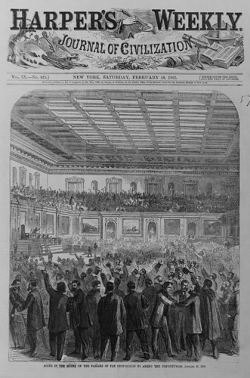A sad and sorry continuity: the North in Spielberg’s “Lincoln”
Posted November 16th, 2012 by Katrina BrowneCategory: History, Popular Culture Tags: 13th Amendment, Abraham Lincoln, Emancipation Proclamation, Fernando Wood, Northern complicity, Steven Spielberg, U.S. Civil War
 I’m one of the jaded ones now.
I’m one of the jaded ones now.
So it surprised me not to find Fernando Wood rearing his pro-slavery head again, this time as a Democratic Congressman from New York. Here he was on the big screen in Steven Spielberg’s film Lincoln, showing up in 1865 as a vocal opponent in Congress to the passage of the 13th amendment. I knew of him from four years earlier, when in 1861, as mayor of New York City, on the heels of South Carolina’s secession, he proposed that the city should also secede from the Union. He was well aware that New York’s economy was inextricably tied to slavery.
Once you know about the North’s complicity in slavery and racism you see the through-line almost everywhere you look. The winter-spring of 1865 that is the subject of Lincoln thus becomes just one more chapter.
In the popular, white, non-southern imagination, we put Lincoln on a pedestal, but we subconsciously put ourselves on that pedestal too, because he is our symbol of northern determination to end slavery. That was us. The good guys.


